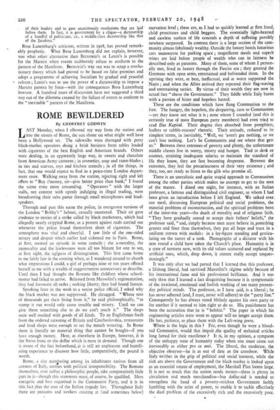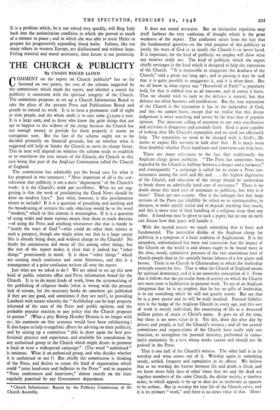ROME BEWILDERED
By GEOFFREY GODWIN
LAST Monday, when I elbowed my way from the station and into the streets of Rome, the sun shone on what might well have been a Hollywood set. The sidewalks were thronged with petty black-market operators doing a brisk business from tables loaded with cigarettes of the best English and American brands. Others were dealing, in an apparently large way, in sweets and chocolate from American Army canteens ; in cosmetics, soap and razor-blades ; in ties and scarves, toys and kitchen utensils ; in all the things, in fact, that one would expect to find in a peace-time London depart- ment store. Walking away from the station, rejecting right and left offers to " Buy t'money, sir—give better price than bank," I found the scene even more astounding. " Operators " with the larger stalls, not content with openly indulging in illegal trading, were broadcasting their sales patter through small microphones and loud- speakers.
Through and past this scene the police, in overgrown versions of the London " Bobby's " helmet, casually sauntered. Their air gave credence to stories of a strike called by black marketeers, which had allegedly nearly crippled Rome, as a protest against raids carried out whenever the, police found themselves short of cigarettes. The atmosphere was vital and cheerful. I saw little of the one-sided misery and despair which earlier had sickened me in Paris. Rome, at first, seemed an episode in some comedy ; the a-morality, the immorality and the lawlessness were all too blatant for one to see, at first sight, the ugliness of disintegration. This first came home to me fairly late in the evening when, as I wandered around to absorb what impressions I could, a girl of perhaps nine or ten years offered herself to me with a wealth of suggestiveness unnecessary to describe. Until then I had thought the Romans like children whose school- master had failed to arrive. Released from Mussolini's regimentation, they had forsworn all order ; seeking liberty, they had found licence.
Speaking later in the week to a senior police official, I asked why the black market was not suppressed. He shrugged. " Where tens of thousands get their living from it," he said philosophically, "to stamp it out would only cause trouble and misery. Until we can give them something else to do we can't touch it." The shops were well stocked with goods of all kinds. To an Englishman fresh from the ordered rationing of Britain and Czechoslovakia, restaurants and food shops were enough to set the mouth watering. In Rome there is literally no material thing that cannot be bought—if you have enough money. Here, as elsewhere in Europe, however, it is the Swiss franc or the dollar which is most in demand. Though one is aware of the fact beforehand,.it is still an unpleasant and humili- ating experience to discover how little, comparatively, the pound is worth.
Rome, a city nu Bering among its inhabitants natives from all corners of Italy, seethes with political irresponsibility. The Romans themselves, ever rather a philosophic people, take comparatively little part in it—though this statement must, of course, be qnalified. Most energetic and best organised is the Communist Party, and it is in this fact that the root of the Italian tragedy lies. Throughout Italy there are peasants and workers existing at (and sometimes below) starvation level ; there are, as I. had so quickly learned at first band, child prostitutes and child beggars. The essentially light-hearted and careless surface of life conceals a depth of suffering possibly nowhere surpassed. In contrast there is a large section of the com- munity almost fabulously wealthy. Outside the luxury hotels luxurious cars manoeuvre for parking space ; magnificent meals and superb wines are laid before people of wealth who can in fairness be described only as parasites. Many of them, some of whom I person- ally met, lived in luxury through the Fascist era ; they greeted the Germans with open arms, entertained and befriended them_ In the uprising they were, at best, ineffectual, and at worst supported the Nazis ; and when the Allies arrived they repeated their flag-waving and entertaining tactics. By virtue of their wealth they are now in actual fact " above the Government." They fiddle while Italy burns with a passion of bitter and hopeless hatred.
These are the conditions which have flung Communism to the fore. The hungry, the hopeless, the despairing, turn to Communism —yet they know not what it is ; none whom I sounded (and this is certainly true of most European party members) had even tried to read Das Kapital. Their dogma they absorbed from pamphlets, leaflets or rabble-rousers' rhetoric. Their attitude, reduced' to its simplest' terms, in inevitably, " Well, we 'aven't got nothing, so we can't lose nothing. Let's be Communists and see where that gets us." Between these extremes of poverty and plenty, the unfortunate middle classes live in worry, misery and hunger. Tied to desk or counter, straining inadequate salaries to maintain the standard of life they know, they are fast becoming desperate. Between the extremes, they feel the precariousness of their very existence ; and they, too, are ready to listen to the glib who promise all.
There is an unrealistic and quite stupid approach to Communism among the other parties which makes no attempt to get to the root of the matter. I dined one night, for instance, with an Italian professor, a famous and distinguished civil engineer, to whom I had been given an introduction before I left England.. We talked over, our meal, discussing European political and social problems, the material problems of reconstruction, and the spiritual problems born of the inter-war years—the death of morality and of religious faith. " They have gradually ceased to accept their fathers' beliefs," the professor said, " and, simply because men must believe injomething greater and finer than themselves, they put all hope and trust in a • uniform strewn with medals: in a lay-figure standing and gesticu- lating on the turret of a tank. Photographs of a dictator with his arm round a child have taken the Church's place. Humanity is in a state of torment now, with its old values scattered and replaced by artificial ones, which, deep down, it cannot really accept unques- tioningly."
It was only after we had parted that I learned that this professor, a lifelong liberal, had survived Mussolini's regime solely because of his international fame and his professional brilliance. And it was only then that I learned a fact disquieting because it is symptomatic of the irrational, emotional and foolish working of too many present- day political minds. The professor, as I have said, is a liberal ; he has never adhered (and, I trust, never will adhere) to the " party line." Consequently he has always voted blithely against his own party or for another if it seemed to hint right to do so. His punishment has been the accusation that he is " bolshie." The paper in which his engineering articles were wont to appear will no longer accept them. He has, perforce, to place them with the Left-wing press.
Where is the logic in this ? For, even though he were a blood- red Communist, would that impair .the quality of technical articles long famed for their excellence ? It is, in my opinion, a symptom of the unhappy state of humanity today when one must come out irrevocably as either pro or anti. The liberal, the moderate, the objective observer—he is as out of date as the crossbow. While Italy writhes in the grip of political and social 'torment, while the rich are above the Government and the black market is looked upon as an essential solace of employment, the Marshall Plan looms large. It is not so much that the nation needs money—there is plenty in circulation and much merchandise—but dollar-aid is needed to strengthen the hand of a poverty-stricken Government feebly fumbling with the .reins of power, to enable it to tackle effectively the dual problem of the excessively rich and the excessively poor.
It is a problem which, be it not solved very"quickly, will fling Italy back into the authoritarian condition in which she proved so much of a menace to peace ; and in which she was able to assist Hitler to prepare his progressively expanding blood baths. Italians, like too Many others in western Europe, are disillusioned and without hope. Failing material and moral assistance, their future is not promising.































 Previous page
Previous page